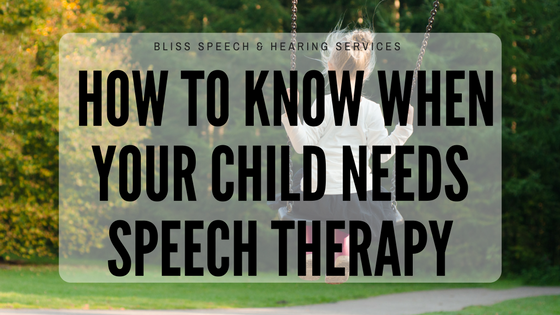How do you know when your child needs speech therapy? According to the National Institute of Health, 1 in 12 children have a speech, language, voice, or swallowing disorder. Boys are nearly twice as likely as girls to face speech and language challenges.
While some of these children will “outgrow” a minor condition or delay, many do not. As parents, we don’t want our child have to deal with or carry any challenges into adulthood that could have been helped if we had sought help earlier. To prevent this, it’s important to know the difference between a developmental delay that falls within the average range when compared to other same aged children, or a true speech and language disorder, one that requires speech therapy services. Let’s explore how to know when your child is in need of speech therapy services.
Milestones
The first step to knowing when your child needs speech/language therapy services is familiarizing yourself with what is normal for an average child your child’s age. Because all children develop at different rates, failure to meet a milestone shouldn’t cause alarm by itself. But it should be the first sign that will prompt you to take a closer look.
The common language milestones for children occur at:
- 18 months – A baby can consistently use 10 or more 1-2 syllable words that are common in his/her environment. He/she can name things when asked, and he can follow a simple direction.
- 2 years – A baby uses around 50 words and begins forming 2 word phrases. He/she loves story time and can sing 1 or 2 simple songs like Twinkle, Twinkle Little Star. Pronunciation won’t be perfect and that’s okay as long as he/she’s trying.
- 3 years – Speech is becoming much clearer and abstract concepts like time begin to make sense. At this age, a child can now use short sentences and carry on a basic conversation. Three year olds love to ask questions about everything. They can follow a simple series of instructions (do this, then that).
- 4 years – By 4, a child can tell you a story that he/she has heard many times. He/she will ask lots of questions, will use more advanced grammar and can carry on conversations with friends.
- 5 years – At 5, a child is better able to explain what he/she has been thinking and can better understand explained consequences — ex: Understands to not touch a hot stove if explained rather than having to find out the hard way. Your child can tell you how to do something step by step and will talk about things that aren’t happening now, like what he/she will do next time he/she visits grandma. If your child has been exposed to words, he/she will typically be reading a little even if not in school.
Interacting With Others
Is your child able to interact at an appropriate age level with adults and other children? When your child speaks, are you and those around your child understanding him/her without too much difficulty? Does he/she seem to relate well to peers? Do adults think your child is much younger than he/she is? Is he/she stuttering or being bullied? Is your child becoming frustrated about not being able to communicate at the level expected of him/her?
In each of these cases, your child is experiencing challenges in his/her ability to interact with others, which could be impacting him/her physically, psychologically, socially and academically. Physically the child’s health may suffer from undue stress, not being able to communicate his/her needs. Psychologically, the child may feel constantly frustrated, may stop trying to speak or may feel isolated. Socially, your child may have trouble connecting with others in a meaningful way and may have trouble filling that need that all humans have to be social. Academically, he/she may have trouble asking questions, providing answers and otherwise interacting in learning situations at school, daycare and at home. In turn, academic performance will suffer.
If your child is having trouble interacting with others and you feel that it’s affecting him/her physically, psychologically, socially or academically, it may be time to get your child some help through speech therapy services.
Related Diagnoses
If your child has been diagnosed with a condition that will likely affect speech, language, voice, fluency, or swallowing, every moment counts. Delaying could impact your child not only in the short term, but for a lifetime. Some examples of conditions that will likely affect the above are:
- Autism
- Articulation disorders
- Cleft lip /palate
- Developmental delays
- Hearing impairment
- Brain injury
- Voice disorders
- Stuttering
- Weak oral motor skills
- Receptive language disorders (difficulty understanding)
- Expressive language disorders (difficulty communicate thoughts)
- Dysphagia (inability to eat due to gagging, coughing, chewing problems, inability to swallow, etc.)
Don’t wait to see if your child is struggling. Early intervention in these instances can help a child, who would have otherwise had significantly delayed speech or language skills, communicate near or at an age appropriate level. If your child has been diagnosed with a speech or language disorder, or if you suspect one, he/she should be seen by a speech/language pathologist.
Talking With Your Pediatrician.
(REVIEW STARTING HERE)
Talk to your child’s pediatrician if your child is lagging behind milestones at all to keep your doctor abreast of your child’s development. If your child is struggling with interacting in his/her environment, your doctor needs to know. If your child has been diagnosed with a related condition, the doctor will likely recommend speech therapy for kids. If he/she doesn’t, ask about it.
The doctor will evaluate your child and may order the use of a developmental screening tool. These tools are designed to give an objective measure of how your child is developing. They help identify risks of delay early, so that they can be addressed. Some of these tests may be administered in the doctor’s office. For others, the doctor will send a child to speech therapy for kids to complete the evaluation.
As in all scientific measures, validity and reliability are important. Validity describes how well a screening measures what it’s intended to measure. A screening is considered reliable if it achieves the same results when performed a second time. While parents have a keen eye for identifying when something isn’t right with a child, these tools help confirm where the specific problems lie, so that they can be addressed.
Some common screening tools include:
- Ages and Stages Questionnaire – For children birth to 5 years, this screening tests communication, gross motor, fine motor and problem-solving skills. Each of these are very important to the way a child communicates with others.
- Brigance Screenings – For children birth through 1st grade, this screening tests expressive language and receptive language (listening & comprehending) among other developmental skills.
- Learning Accomplishment Profile-Diagnostic Screen – For ages 3-6, this screening tests social development and language among other skills.
Each of these tests meet government standards for validity and reliability. If your child is struggling, ask for one of these or a similar test. Based upon the results of these screenings, it may be advisable for your child to attend speech therapy for kids.
Speech Therapy For Kids In Dallas, TX
If your child is exhibiting these warning signs, it’s time to get a speech evaluation. We’re Bliss Speech and Hearing and we specialize in helping children reach their full potential by developing individualized plans to meet your child’s unique needs.
Contact us today to schedule an appointment.



